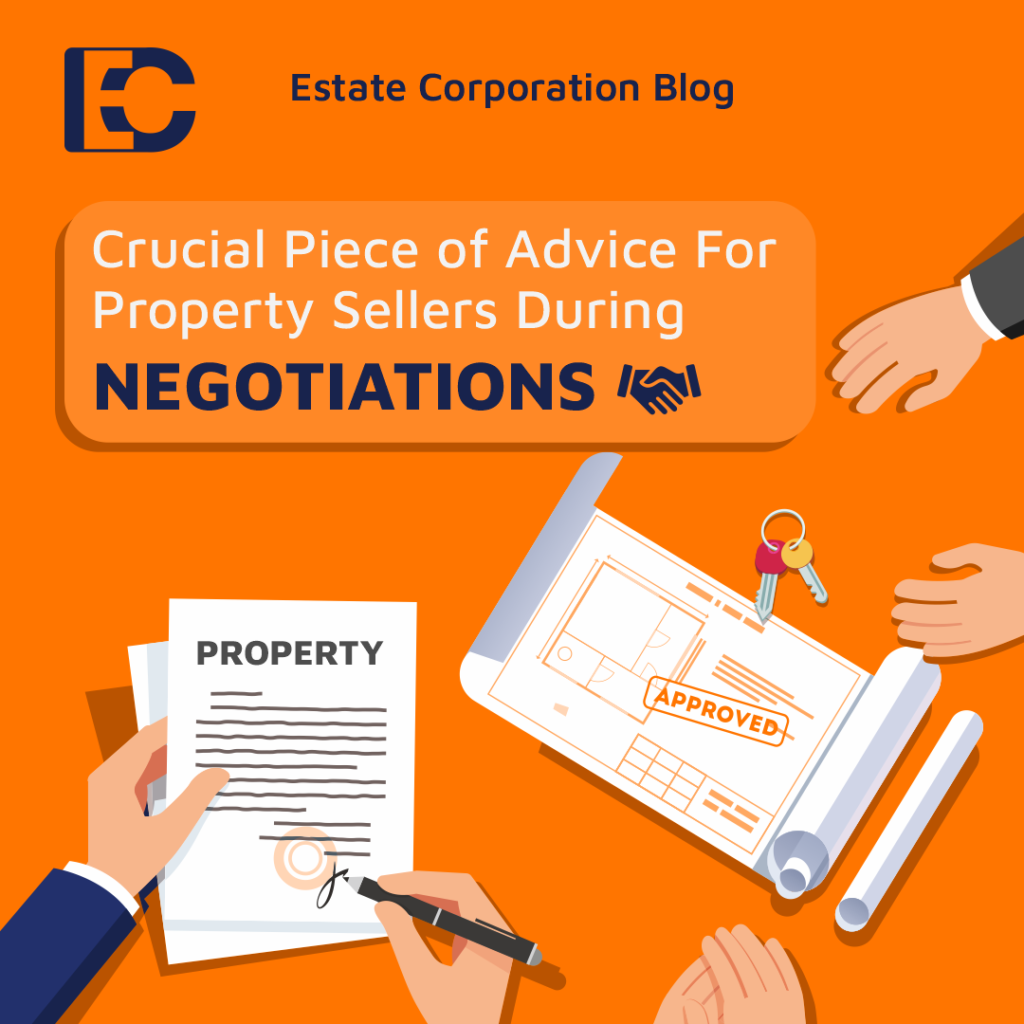
Negotiations when selling property
The price you agree on with a buyer and the real estate fees you pay will decide how much money you walk away with when selling your home, which is probably one of the largest financial transactions you’ll make in your lifetime.
There are legitimate negotiations and pointless wrangling. Negotiating for a house is significantly different than haggling with a grocery store about a small price reduction. The former requires a carefully considered plan that takes into consideration the skills of an experienced veteran negotiator on the other side of the table and involves a sizable investment-grade asset. Estate Corporation gives you a peek into the handful of tricks you can use to sell or buy the property you want; you can make your life easier by employing Estate Corp to do your grunt work!
Advice for Negotiations

Always Counter
If an initial offer for your house is less than what you are asking for it, you as the seller generally won’t want to accept it. The initial offer made by buyers is frequently less than your list price, but it may also be less than what they are ready to pay because they typically anticipate a back-and-forth negotiation.
Because they are worried about losing the prospective sale at this point, most sellers will submit a counteroffer with a price that is higher but still below their list price. To complete the transaction, they want to appear open to compromise and adaptable. As thousands of sellers will confirm, this tactic does certainly work to sell the home, but it’s not always the greatest approach to obtain top dollar.
Counter by maintaining your quoted purchase price rather than lowering it. Real buyers will keep the conversation going and eventually make you a greater offer. If you’ve priced your property fairly from the start, countering at your list price shows that you are aware of its value and that you plan to collect the compensation you are due. Your refusal to compromise may surprise buyers, and some may be put off by it. When you employ this tactic, there is a chance that a buyer will back out. You’ll also save time by not dealing with purchasers that make lowball bids and won’t sign a contract unless they can get a good deal.
A Bidding War
Using open house as a tactic to instigate an interesting strategy of a bidding war. Plan an open house for a few days after placing the house on the market and making it accessible for viewing. Keep any offers off the table until after the open house. As a result of anticipating competition, prospective buyers might make greater bids. If you receive several bids, you can return to the leading bidders and request their highest and best offer. The open house may, of course, result in just one offer, but the party making it won’t be aware of that, giving you a psychological advantage as you move forward with counteroffers, etc.
Expiry date on the Counteroffer
Let’s say a buyer file an offer, and you challenge it because you don’t want to accept it. You will then engage in negotiations with that party, and while it is not against the law, it is typically thought to be immoral to accept a higher offer from another bidder if one should present itself.
It is possible to participate in several talks with various purchasers at once. The decision to reveal or withhold this information from potential buyers is up to the seller. Greater offers may follow from disclosure, but a buyer may become scared off by it. Legally, the seller may reject more than one offer concurrently, but only if they do so in a manner that makes the other parties aware of the situation.
Be open about asking other favors
Instead of adhering to your proposed price, if the vendor won’t lower the price, make new demands. Be imaginative in your request and provide further concessions. The owner might want to cover additional fees for upkeep and repairs. Being smart with your offers is a skill and a service Estate Corporation holds expertise in.
Be flexible
It’s common for sellers to accept a somewhat lesser offer if it has ideal settlement conditions. Thus, instead of being rigid about the price, attempt to make some concessions. Having the ideal home is obviously a dream. So, the buyer should give up looking for the ideal home at the ideal price. You might need to make feature compromises in terms of location, size, and cost. If you are willing to be flexible when negotiating the price, you will be one step closer to clinching the business.
Conclusion
A buyer must conduct extensive research before starting a serious negotiation with a real estate seller. There are various individuals involved in the field of real estate, understanding who to approach is important. A little read through the different responsibilities of different individuals in the field from our previous blog will help you gain that insight. Researching the builder or seller’s reputation, the state of the market, the benefits and drawbacks of one’s personal spending plan, and the features and circumstances of the property one plans to purchase.
Although there are clear benefits to negotiation, a lot depends on outside conditions. The main distinguishing characteristic is whether it is a buyer’s or seller’s market. There are fewer vendors and more buyers in a seller’s market, thus there aren’t many opportunities to receive significant discounts. In buyers’ markets, there are many properties and few purchasers, increasing the likelihood of obtaining significant discounts and alluring offers from the developers. It’s all about understanding a multilayer system, it can be hard, but Estate Corporation makes it easier!
